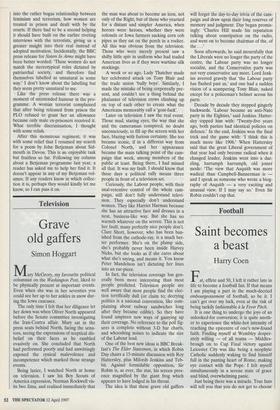Television
Grave old gaffers
Simon Hoggart
Mary McGrory, my favourite political columnist on the Washington Post, liked to be physically present at important events. Even when she was in her seventies you could see her up to her ankles in snow dur- ing the Iowa caucuses.
The only time I felt that her diligence let her down was when Oliver North appeared before the Senate committee investigating the Iran-Contra affair. Mary sat in the press seats behind North, facing the sena- tors, seeing the expressions of sceptical dis- belief on their faces as he rambled evasively on. She concluded that North had performed poorly and had unwittingly exposed the cynical malevolence and incompetence which marked those strange events.
Being lazier, I watched North at home on television. I saw his Boy Scouts of America expression, Norman Rockwell vis- its Iwo Jima, and realised immediately that the man was about to become an icon, not only of the Right, but of those who yearned for a distant and simpler America, when heroes were heroes, whether they were colonels or Iowa farmers sucking corn cob pipes as they sat on the porch in a rocker. All this was obvious from the television. Those who were merely present saw a shifty little spiv in uniform who had traded American lives as if they were wartime silk stockings.
A week or so ago, Lady Thatcher made her celebrated attack on Tony Blair and the trade union 'bully boys'. Similarly, I made the mistake of being corporeally pre- sent, and couldn't see a thing behind the phalanxes of television crews climbing up on top of each other to create what the Americans memorably call a `goat-fuck'.
Later on television I saw the real event. Those mad, staring eyes, the way that she and the cameraman conspired, no doubt unconsciously, to fill up the screen with her face, blazing with furious certainty. She too became iconic, if in a different way from Colonel North, and her appearance became the main talking point of the cam- paign that week, among members of the public at least. Being there, I had missed all that. It was my fault. I should know that these days a political rally means three people in front of a television set.
Curiously, the Labour people, with their anal-retentive control of the whole cam- paign, still don't fully understand televi- sion. They especially don't understand women. They like Harriet Harman because she has an attractive face and dresses in a neat, business-like way. But she has no warmth whatever on the screen. This is not her fault; many perfectly nice people don't. Clare Short, however, who has been ban- ished from the cathode-ray, is a much bet- ter performer. She's on the plump side, she's probably never been inside Harvey Nicks, but she looks as if she cares about what she's saying, and means it. You know Peter Mandelson isn't dictating her lines into an ear-piece.
In fact, the television coverage has gen- erally been more interesting than most people predicted. Television people are well aware that most people find the elec- tion terrifically dull (or claim to; decrying politics is a national convention, like com- plaining about railway sandwiches long after they became edible). So they have found umpteen new ways of gussying up their coverage. No reference to the poll fig- ures is complete without 3-D bar charts, and whooshing noises to indicate the size of the Labour lead.
One of the best new ideas is BBC Break- fast's The Elder Statesmen, in which Robin Day chairs a 15-minute discussion with Roy Hattersley, plus Milords Jenkins and Teb- bit. Against formidable opposition, Sir Robin is, as ever, the star, his screen pres- ence magnified by the giant frog which appears to have lodged in his throat.
The idea is that these grave old gaffers will forget the day-to-day trivia of the cam- paign and draw upon their long reserves of memory and judgment. Day began promis- ingly: 'Charles Hill made his reputation talking about constipation on the radio, and went on to become chairman of the, of the ...'
Soon afterwards, he said mournfully that the Liberals were no longer the party of the centre, the Labour party was no longer socialist, and the Conservative party was not very conservative any more. Lord Jenk- ins averred gravely that 'the Labour party has flashed past us,' and one had a sudden vision of a scampering Tony Blair, naked except for a policeman's helmet across his parts.
Decade by decade they stepped gingerly backwards. 'Labour became an anti-Nato party in the Eighties,' said Jenkins. Hatter- sley topped him with: 'Twenty-five years ago, both parties had identical policies on defence.' In the end, Jenkins won the final trick and the game with: 'I think this is much more like 1906.' When Hattersley said that the great Liberal government of that year had only become radical when it changed leader, Jenkins went into a daz- zling, harrumph harrumph, old josser mode: 'The view that Asquith was more wadical than Campbell-Bannerman is — and I speak as someone who wrote a biog- raphy of Asquith — a very exciting and unusual view. If I may say so.' Even Sir Robin couldn't cap that.


































































 Previous page
Previous page